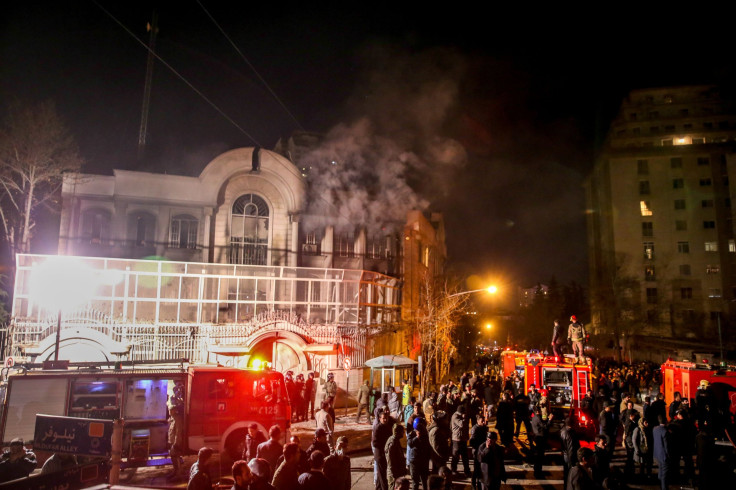Protesters Angry Over Nimr Execution Set Fire To Saudi Embassy In Tehran

The protests in Iran following Saudi Arabia's mass execution that killed Shiite cleric Nimr al-Nimr Saturday reached a boiling point when demonstrators ransacked the Saudi Embassy in Tehran and set it on fire. Crowds broke furniture and smashed windows, the New York Times reported.
The fire at the embassy came after protesters in Mashhad, a city in the northeast part of the country, set fire to the Saudi Consulate there. Both incidents were part of huge protests that took place across the world over the execution of Nimr.
#Tehran police chief told Tasnim that some of attackers on #SaudiArabia embassy in Tehran have been arrested.
#Iran
— Abas Aslani (@abasinfo) January 2, 2016Reports on Twitter said the embassy staff were not in the building during the fire.
Mohammed al-Nimr, Nimr's brother, asked for people to remain calm. "This action will spark anger of [Shiite] youths" in Saudi Arabia, but "we reject violence and clashing with authorities", he said, according to Al Jazeera.
Iran’s Foreign Ministry condemned the execution, calling it "the depth of imprudence and irresponsibility" on the part of the Saudi government.
"The Saudi government will pay a heavy price for adopting such policies," Hossein Jaber Ansari, Iran's foreign ministry spokesman, was quoted as saying by the semi-official Fars news agency.
The U.S. State Department said Sunday that the execution would exacerbate sectarian tensions
"We reaffirm our calls on the government of Saudi Arabia to respect and protect human rights, and to ensure fair and transparent judicial proceedings in all cases," spokesman John Kirby said in a statement after the execution of Nimr al-Nimr and 46 other people.
President Barack Obama is on vacation with his family in Hawaii, but White House deputy national security adviser Ben Rhodes said the administration has urged the Saudis to show restraint regarding respect for human rights.
“We broadly, I think, have concerns about human rights issues in Saudi Arabia, and again we also would like to see steps taken by Saudi Arabia and other countries to reduce sectarian tensions in the region," Rhodes said, Reuters reported.
_ PHOTOS showing damage inflected by Iranian protesters to the offices of #Saudi Consulate in Mashhad earlier today. pic.twitter.com/pkSeoFlIv9
— Hasan Sari (@HasanSari7) January 2, 2016Former Iraqi Prime Minister Nouri al-Maliki said in a statement that his countrymen "strongly condemn these detestable sectarian practices and affirm that the crime of executing Sheikh al-Nimr will topple the Saudi regime as the crime of executing the martyr al-Sadr did to Saddam," referencing the death of another prominent cleric in Iraq in 1980.
© Copyright IBTimes 2025. All rights reserved.





















